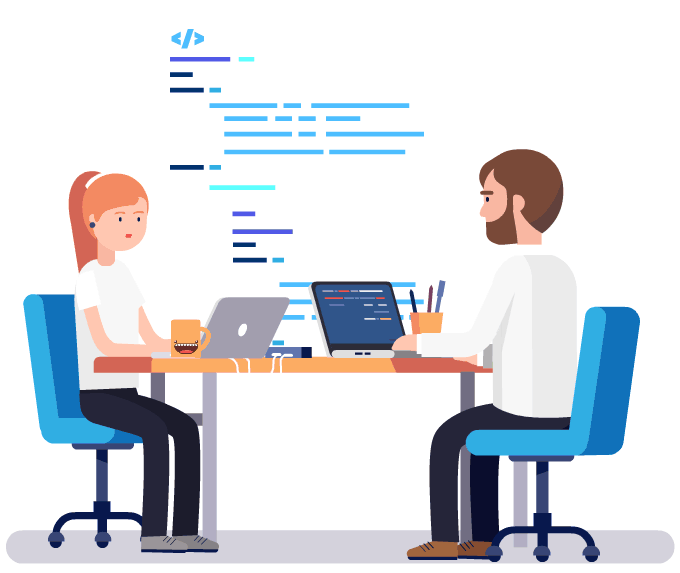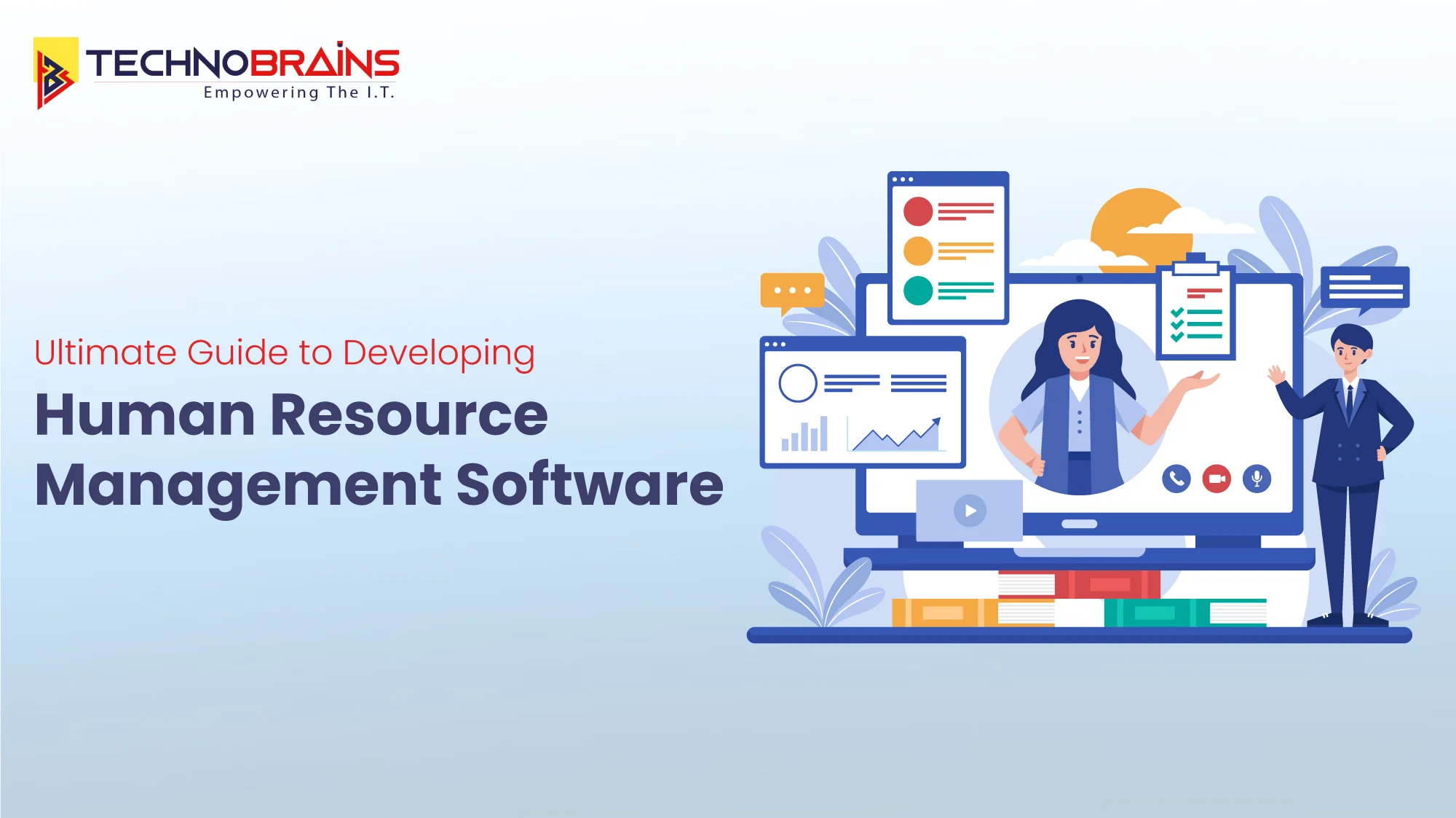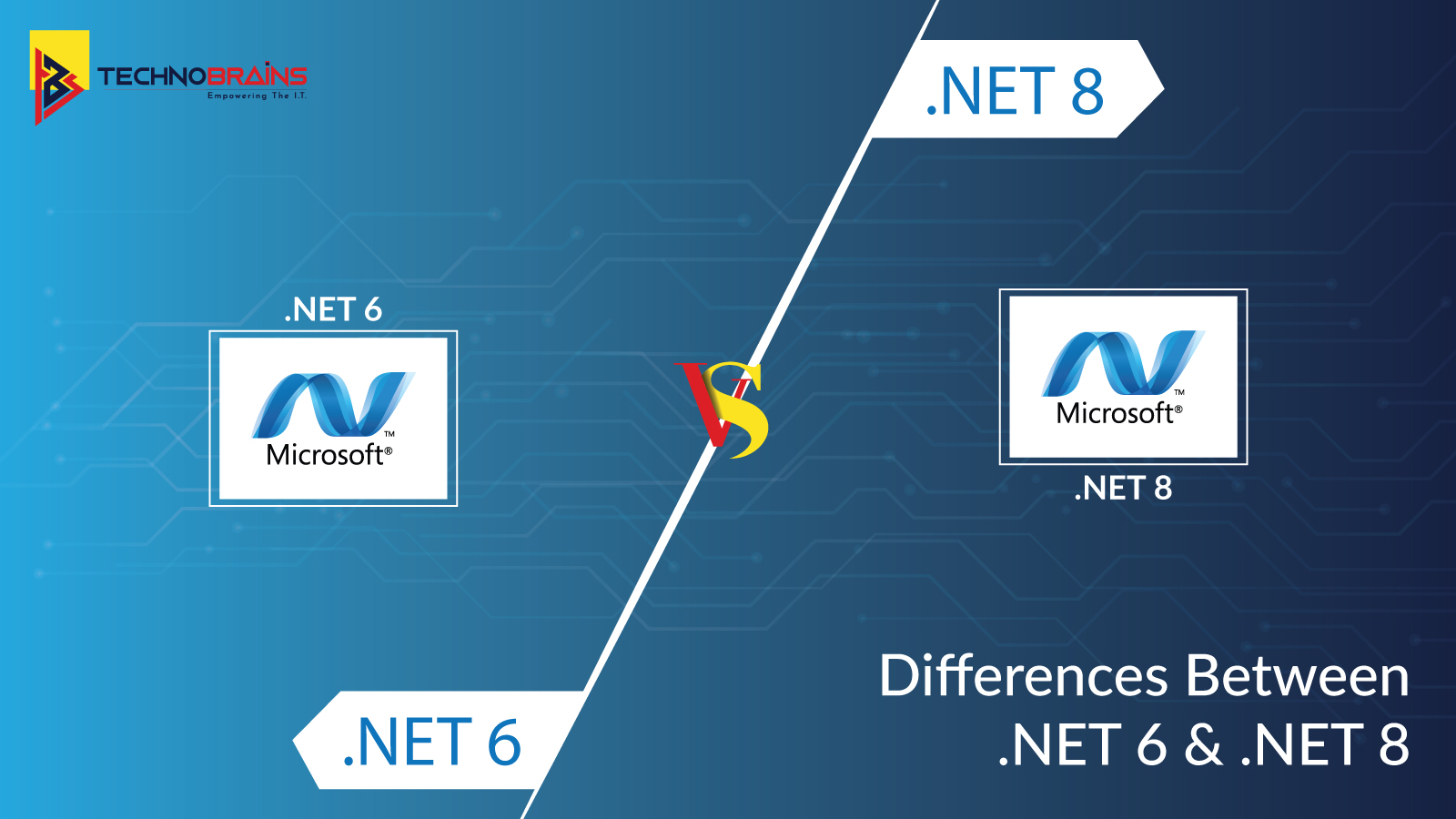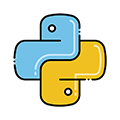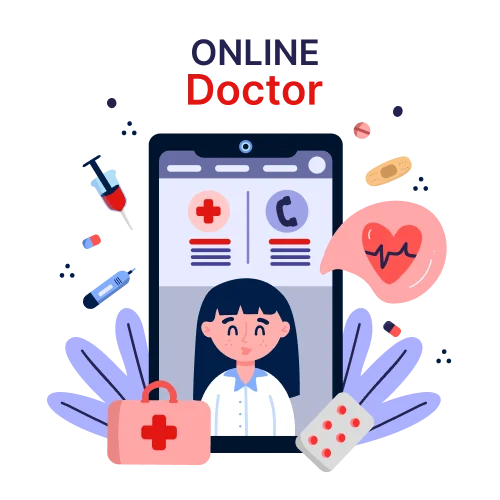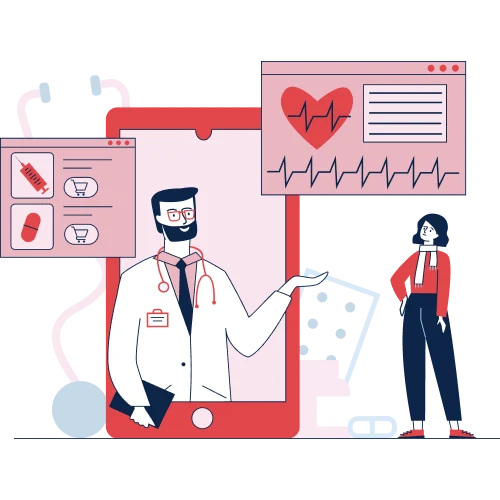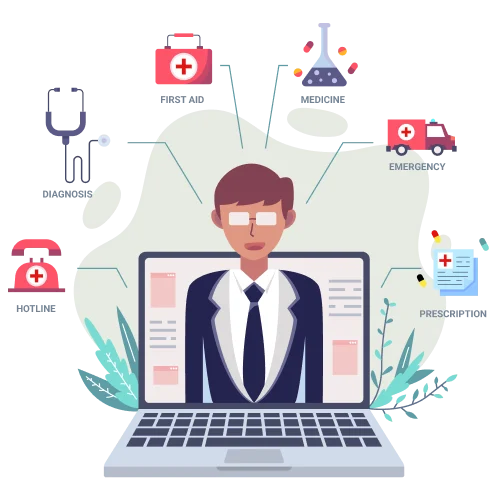Get 40 Hours Free Developer Trial
Test Our Developers for 40 Hours at No Cost - Start Your Free Trial →
The HRMS has completely changed the way organizations manage their workforce and operations in general. The Ultimate Guide To HRMS Software, starting from what it is and the development process to the key HRMS Management System Features, costs involved, and why TechnoBrains should be your trusted partner in creating HRMS solutions.
What Is HRMS Software?
HRMS stands for Human Resource Management System; it is a comprehensive tool that aids in automating a wide array of tasks and processes relating to human resources, including recruitment, employee management, payroll, performance tracking, and many others. In other words, HRMS consolidates all the aspects of the HR functions on one single platform through which an organization operates its workforce.
Key Components of HRMS Software:
- Employee Information Management: HRMS updates all employee records concerning their personal information, job descriptions, contacts, and work experience.
- Onboarding and Recruitment: The software handles recruitment, starting from posting job notices to onboarding.
- Time and Attendance Management: This records the number of working hours put in by an employee, overtime worked, sick leaves availed of, and days off to ensure correct payroll and adherence to labor laws.
- Payroll Management: This module automates payroll computation regarding salaries, deductions, bonuses, and taxes.
- Performance Management: HRMS maintains records of employee performance can be conducted, feedback provided, and goals set within the system.
- Employee Self-Service: It provides an employee self-service portal from where employees can download their payslips, apply for leave, and make personal changes.
The HRMS would integrate with other business systems, such as accounting and ERP tools, to give a full-circle view of the operations of the company. Most HRMS platforms are cloud-based, which makes access easy anytime and anywhere while ensuring data security.
It will also help organizations reduce human errors, increase output, and adhere to labor laws. Automation of time-consuming administrative tasks by the HRMS will free up the teams to work on strategic initiatives that drive business growth.
Different Types of HRMS Software Development
Any HRMS software involves various needs, functionalities, and deployment methods in its development. The development of HRMS can be categorized based on specific business needs. Here are the different types of HRMS software mentioned below:
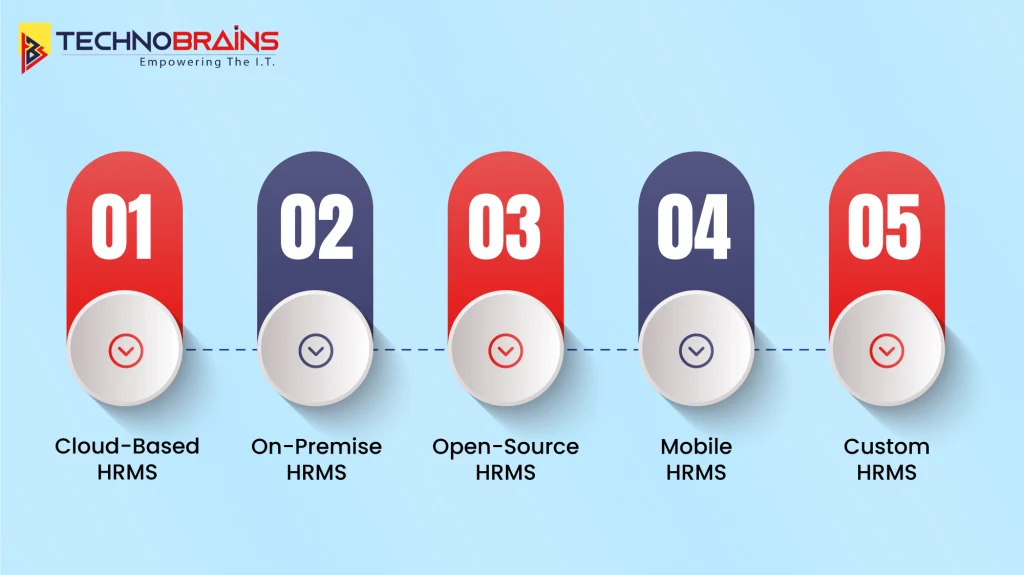
Cloud-Based HRMS
The cloud-based HRMS is stored on remote servers and accessed online. This solution rules out any on-site IT infrastructure requirement and offers scalability and flexibility.
Advantages:
- Lower up-front costs
- Easier to maintain, update
- You can use it literally from any place that has an internet connection.
- Features and updates from vendors frequently appearing
Ideal for the service is ideal for small to medium-sized businesses looking for a service that is cost-effective yet scalable.
On-premise HRMS
The On-premise HRMS installed within the company is maintained by themselves, providing all the ownership of the system and full data control.
Advantages:
- Better data security and control
- Customizable to the company’s needs
- Full ownership of software and upgrades
Ideal for large enterprises with special needs regarding security, compliance, or other types of customizations.
Open-Source HRMS
Open-source HRMS legally allows the business to make changes in the actual code of the software, thus offering complete flexibility in terms of customization.
Advantages:
- Cost-effective, as no license fees are payable
- High Flexibility and fully customizable
- Community-driven support and regular updates
Best for Companies that have an internal development team that can take over and manage the customizations.
Mobile HRMS
Mobile HRMS is optimized for both smartphones and tablets, making the platform accessible anywhere and anytime for both employees and HR managers.
Advantage:
- Increased access to remote teams
- Real-time information and updates
- Improved user experience through mobile-friendly features
Best for businesses with several mobile employees or working remotely.
Custom HRMS
A customized HRMS is tailored from scratch to business needs; hence, it extends complete flexibility in the top features of HRMS software and integrations.
Read Also, Why Choose TechnoBrains for Property Management Software?
Advantages:
- Fully customized to meet specific business needs.
- Seamless Integration with Existing Systems
- Long-term scalability
Ideal for large organizations with complex HR needs, or organizations needing highly specialized labor.
Benefits of HRMS Management Software
The benefits of HRMS software are that it can considerably enhance the efficiency and effectiveness of the HR operations of an organization. A few of the key benefits of a Human resource management system are listed below:
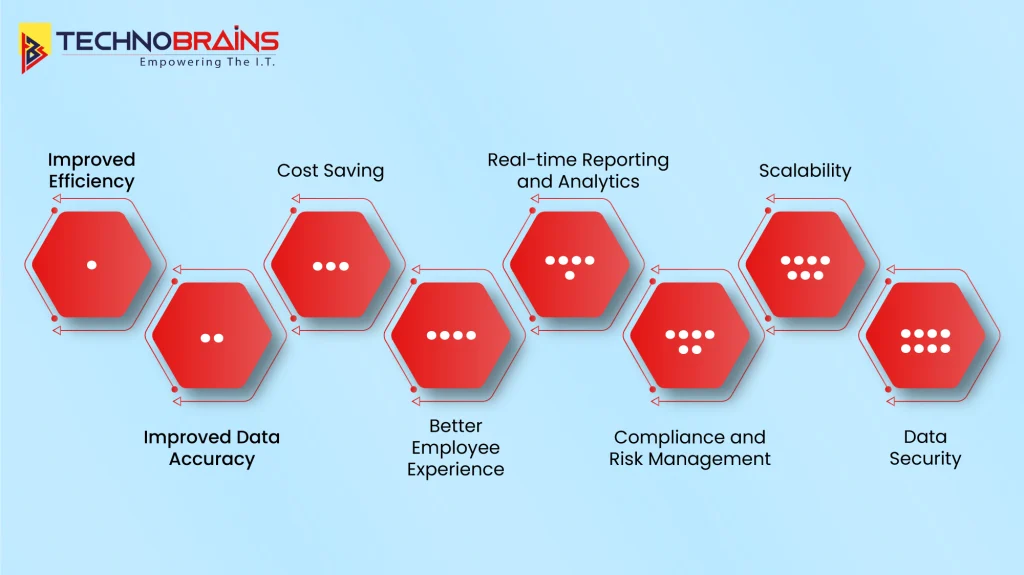
Improved Efficiency
- It works on automating mundane tasks that the HR staff has to conduct daily, such as payroll processing, attendance, and recruitment processes, and saves productive time.
- The HR department can automate the workflows and minimize human errors to a great extent, thus increasing operational efficiency.
Improved Data Accuracy
- Manual entry of the HR data induces errors, and on the other hand, the HRMS guarantees accuracy in the collection and management of the data.
- Payrolls, benefits, and performance recordings are automated processes, hence reducing anomalies and enhancing consistency.
Cost Saving
- Automation decreases the need for more HR personnel and saves time which would have been used in administrative activities.
- It eliminates expensive mistakes and inefficiencies that could lead to a financial loss for the HRMS.
Better Employee Experience
- The HRMS facilitates that employees can access their personal information, payslips, and benefits without going to HR.
- Self-service options engage employees by making them take responsibility for tasks contributing to greater engagement and happiness at work.
Real-time Reporting and Analytics
- HRMS is the right place for real-time data analytics, giving considerable insight into workforce trends, performance, and compensation.
- It enables management to make informed decisions using data-backed reports.
Compliance and Risk Management
- HRMS ensures that companies are at par with labor laws, tax regulations, and industry standards.
- The important deadlines and policies will be tracked by the software, thus reducing the potential for fines and other possible legal issues.
Read Also, Differences Between DevOps Engineers and Software Engineer
Scalability
- The HRMS software will easily grow with the company, accommodating increasing employee numbers and evolving business needs.
- New features, modules, or integrations can be added over time, ensuring that the system evolves alongside your company’s needs.
Data Security
- HRMS platforms employ the best security features, including encryption, multi-factor authentication, and regular backups of data, to keep sensitive employee data safe.
- It provides robust solutions for fluctuating workloads during peak seasons, ensuring efficiency even during rapid organizational changes.
Key Features of HRMS Software Development
The features of a human resource management system will make it even more functional in meeting organizational HR needs. These include, but are not limited to:
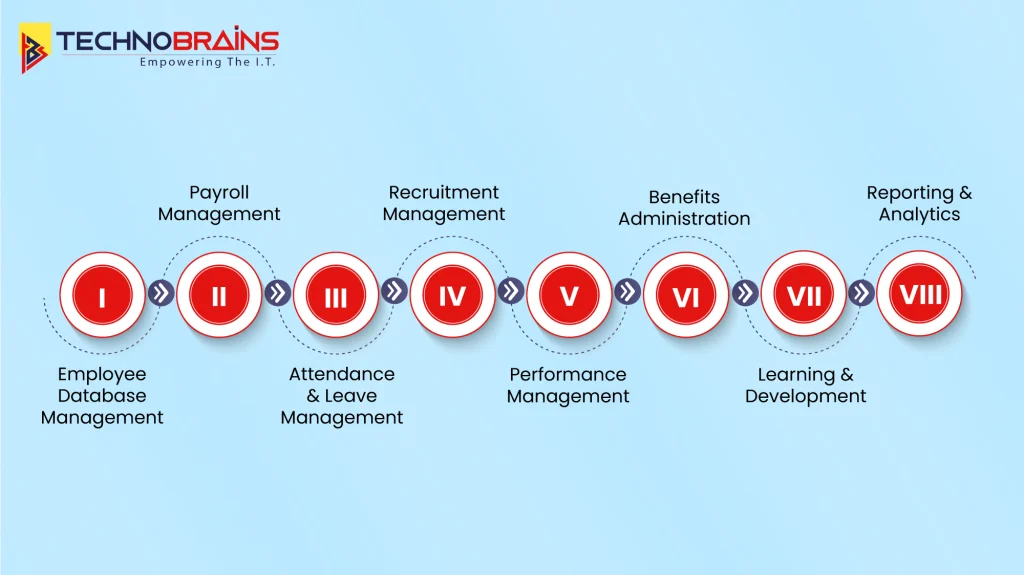
Employee Database Management
- A centralized repository to store employee data dealing with personal information, work history, and performance records.
- Ensures that HR personnel will have quick and easy access to any information concerning the employees.
Payroll Management
- Automates the calculation of salaries, deducting taxes, and adding bonuses.
- Allows integration with other financial systems to process payroll on time and accurately.
Attendance and Leave Management
- Records hours worked, vacation time taken, days off for illness, and overtime.
- Employees can request time off, and managers are allowed to approve or reject these requests right through the system.
Recruitment Management
- Simplifies the recruitment process by posting jobs, screening resumes, scheduling interviews, and extending job offers.
- It also provides insight to HR teams for candidate tracking, thus ensuring that the hiring process runs smoothly.
Performance Management
- Tracks employee performance through evaluations, feedback, and goal-setting features.
- The HR teams and their managers can identify who their top performers would be and which areas need to be improved.
Benefits Administration
- Responsible for employee benefits, health insurance, retirements, and bonuses.
- Allows viewing and updating employee benefits information.
Learning and Development
- Tracks employee training, certifications, and skill development.
- Shall enable the human resource departments to plan, schedule, and plan for various employee development programs.
Reporting and Analytics
- Provides real reporting on a variety of HR metrics, from turnover and recruitment success to employee satisfaction.
- It helps HR professionals and management in making decisions based on factual data.
What does Customized HRMS Software Development Cost?
The HRMS software development cost could be based on the types of HRMS software needed, the complexity of its features, the technology to be deployed, or even the size of an organization. Cost factors are varied in some ways, as described here:
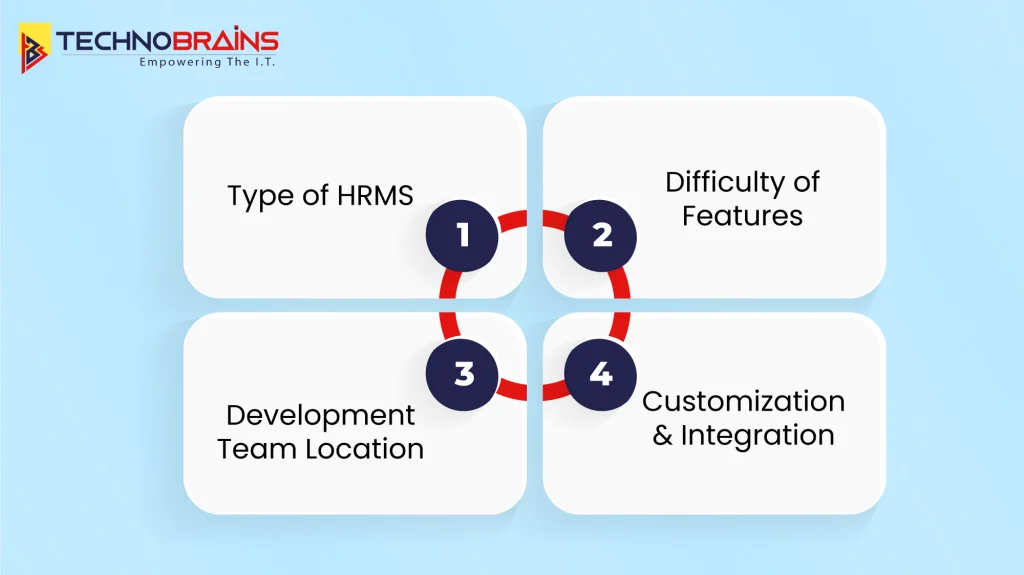
Type of HRMS
- Cloud-Based Solutions: Generally less expensive, they are priced mainly by subscription.
- In-House Solutions: Higher upfront costs for software and hardware, including maintenance costs.
- Custom HRMS: This is the costliest because it has features and integrations custom-made to suit the organization.
Difficulty of Features
- The basic solutions of HRMS are usually cheaper, while their core features include payroll, attendance, and recruitment.
- Other advanced capabilities, like AI-driven analytics, mobile access, and real-time reporting, will further add to the cost.
Development Team Location
- It reduces the overall cost of development by hiring developers in regions where labor costs are lower.
- This, however, ensures that the software quality and functionalities are achieved with experienced developers.
Customization and Integration
- Integrating the HRMS with existing software (like ERP or accounting systems) will increase the cost of development.
- Highly customized HRMS solutions, which meet unique business needs, come with higher development costs.
Why TechnoBrains For HRMS Software Development?
TechnoBrains offers bespoke and scalable HRMS solutions on demand, with safety from any kind of breach in one’s business. TechnoBrains is distinct in the following ways about HRMS software development:
Experience in The Development of HRMS
- Our team has vast experience in the design and development of various industries’ HRMS solutions.
- We understand what the needs of an HR department are and build tailored solutions that give practical results.
Customization and Scalability
- We deliver fully customized HRMS platforms that meet your exact business objectives.
- Our solutions scale alongside your business so that your HR operations scale exactly like you grow.
Advanced Features and Integration
- We integrate advanced features like real-time analytics, AI-driven insights, and mobile access to make sure your HRMS meets modern demands.
- Our platforms integrate without hassle with other business tools, including ERP systems.
Cost-Effective Solutions
- TechnoBrains provides quality HRMS development at very competitive prices with both cloud-based and on-premise solutions, it would be a particularly effective choice.
- We ensure you get maximum value for your money by offering reliable, cost-effective HR-related solutions.
Dedicated Support and Maintenance
- Our maintenance and troubleshooting services are ongoing to ensure seamless workflow with the HRMS solution provided by our support team.
- We immediately report information to you and ensure your system is always updated with the latest trends in HR and compliance requirements.
Read Also, A Guide to Integration Custom Software with Your Existing Systems
Conclusion
therefore, be that for every business entity, HRMS software development is a necessity for making their HR function smooth. By adopting the appropriate HRMS solution, you can facilitate improvement in the efficiency and satisfaction of your employees to achieve overall business growth. TechnoBrains stands out as your ideal partner for HRMS software development because of our expert solutions, cost-effectively adapted to meet your needs.
Still stuck with questions? Contact Us today and get all your solutions here.
